
12 – 14.2.2004
香港演藝學院歌劇院
Hong Kong Academy for Performing Arts Lyric Theatre
中國京劇院、北京京劇院聯合赴港演出團
The China National Beijing-Opera Theater and The Peking Opera House of Beijing


12 – 14.2.2004
香港演藝學院歌劇院
Hong Kong Academy for Performing Arts Lyric Theatre
中國京劇院、北京京劇院聯合赴港演出團
The China National Beijing-Opera Theater and The Peking Opera House of Beijing
普通話演出,附中文字幕及英文故事大綱 Performed in Putonghua with Chinese surtitles and English synopses
節目詳情 For programme details
12.2.2004Page12 頁 13.2.2004Page14 頁 14.2.2004(日場 matinee) Page16 頁 14.2.2004(晚場 evening) Page22 頁
為了讓大家對這次演出留下美好印象,請切記在節目開始前關掉手錶、無㵟電話及傳呼機的響鬧裝 置。會場內請勿擅自攝影、錄音或錄影,亦不可飲食和吸煙,多謝合作。
To make this performance a pleasant experience for the artists and other members of the audience, PLEASE switch off your alarm watches, MOBILE PHONES and PAGERS. Eating and drinking, unauthorised photography and audio or video recording are forbidden in the auditorium. Thank you for your co-operation.
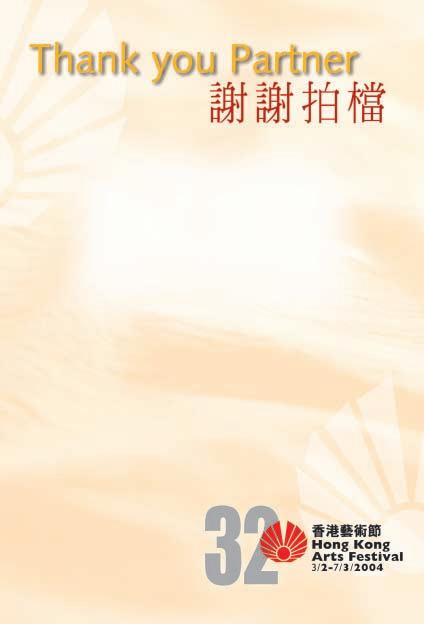
Your support and sponsorship has made possible the Festival attraction The Art of Cheng Yanqiu: 100 th Anniversary . With grateful thanks from the Hong Kong Arts Festival.
We wish you and your guests a very enjoyable evening.
多謝您們的贊助及支持,使 程派藝術一百年
得以順利在香港藝術節演出。
希望您們有一個愉快的晚上。
中國京劇院、北京京劇院聯合赴港演出團
團長
王玉珍
藝術總監/副團長
高牧坤
副團長
張德才
秘書長/司鼓
李金平
秘書
京劇導師
李文敏
港龍航空為中國京劇院及北京京劇院提供航空服務 The China National Beijing-Opera Theater and The Peking Opera House of Beijing are flown in by

演員
張火丁張火千宋小川呂昆山李文林顏世奇
孫少東張亞寧金星俞雷趙志強侯冰
張啟善田永剛尹松濤王旭東張樹培李松年 高琛劉佳楊俊峰孫培鴻金立水郭振龍
石岩景璉璉耿巧雲呂昕徐暢王岩
唐禾香劉珊珊張鑫顧謙金健萍
演奏員
王慶榮許謹忠郭毅馬忠昆許一然朱世傑
李西陵趙寧周佑君邱小波沈紅喜黃珂
杜金嬌
舞台技術人員
李竟成王凡于立德羅鐵環張鴻起赫國新 張生聶國忠曹銳
演員
郭偉董圓圓劉山麗李宏圖朱強韓勝存 陳俊傑翟憲忠梅慶陽李丹曾寶玉崔曉艷 蘇秋冬劉亞傑包金小
演奏員 裘新趙旭 易小軍封千舒健王 葳
舞台技術人員 孫寶林劉學禮佟風祥 北京戲曲藝術職業學院
演員 沙霏
演奏員 王碩
閣下只需在票尾背面寫下姓名、香港身份證號碼及聯絡電話,完場 後投進設於劇院大堂的 港龍航空抽獎箱 ,即可參加抽獎。抽獎結果 將於二OO四年三月八日之英文《虎報》、《南華早報》、《大公報》及 《明報》刊登。
節目演出日期:
中國京劇院及北京京劇院《程派藝術一百年》 12 – 14.2.2004 香港演藝學院歌劇院
北京京劇院《生行七代話譚門》 20 – 21.2.2004 香港文化中心大劇院

Don’t forget to write your name, HKID number and contact telephone number on the back of your ticket to this performance and drop it in the Dragonair lucky draw box at the foyer of the auditorium on your way out.
Winners’ names will be published in the Hong Kong Standard, the SCMP, Tai Kung Pao and Ming Pao on the 8 March 2004.
Performance Schedules:
The Art of Cheng Yanqiu: 100th Anniversary 12 – 14.2.2004 Hong Kong Academy for Performing Arts Lyric Theatre
Two Centuries of the Legendary Tan Family 20 – 21.2.2004 Hong Kong Cultural Centre Grand Theatre

中國京劇院 1955 年 1 月成立,為中國文化部直屬的國家藝術院團,首任院長為 京劇藝術大師梅蘭芳,現由劇作家吳江擔任院長。劇院包括一團、二團及三團, 㶅聚各界精英,包括藝術大師李少春、袁世海、著名導演阿甲、著名劇作家翁偶虹、 范鈞宏等。
中國京劇院先後公演超過二百五十部傳統及現代劇目,獲獎無數,包括多次奪得文華大 獎、梅蘭芳金獎、梅花獎及中國京劇節金獎等重要獎項。中國京劇院致力促進中外文化
交流,曾出訪五十多個國家和地區,足跡遍及五大洲,演出大獲好評。
北京京劇院於 1979 年成立,現由王玉珍擔任院長,團內有國家一級演員、演奏員、編導 等高級藝術人才五十餘名。二十多年來,劇院先後上演三百餘齣各個流派的傳統劇目, 以及創作了三十多齣全新劇目,其中的代表作曾獲得京劇藝術節金獎和文華大獎,在戲 劇界受到普遍稱譽。北京京劇院不僅活躍於國內舞台,還經常出國演出,為使國粹藝術 走向世界,參與國際上的文化交流作出貢獻。
The China National Beijing-Opera Theater was formed in 1955 with the renowned Beijing Opera performer Mei Lanfang as its first director. The theater, comprising three troupes, has attracted a galaxy of prominent artists including Li Xiaochun, Yuan Shihai, as well as famous director Ajia, and playwrights Weng Ouhong and Fan Junhong.
The Theater has performed more than 250 traditional and new operas, and has won numerous awards over the years, including the Wenhua Performance Prize, the Mei Lanfang Gold Medal, the Plum Blossom Prize for excellence in Chinese drama and the Gold Medal in the Chinese Beijing-Opera Festival. The Theater has given highly acclaimed performances in more than 50 countries.
Established in 1979, the Peking Opera House of Beijing is led by Wang Yuzhen. More than 50 members of the troupe are classified among the “First Rank” of the nation’s actors, musicians, directors and playwrights. Over the years, the Peking Opera House of Beijing has staged over 300 opera classics representing various schools of the art. It has also put on more than 30 new productions, to widespread critical acclaim. Many of the productions have subsequently received awards of national importance, including the Gold Medal in the Peking Opera Festival and the Wenhua Performance Prize.
Apart from performances in China, the troupe has performed overseas promoting Beijing opera and furthering artistic cultural exchanges.
演出長約2小時45分鐘,
包括一節15分鐘中場休息
鎖麟囊
演員表
薛湘靈 張火丁
周庭訓 宋小川
胡 婆 金立水
梅 香 金健萍
趙祿寒 李文林
天 麟 王 岩
老儐相 張亞寧
鑼 夫 孫少東
盧 義 侯 冰
趙守貞 徐 暢
薛 良 顏世奇
薛夫人 呂 昕
碧 玉 呂昆山
盧員外 俞 雷
大 器 崔曉艷
大儐相 金 星
盧 仁 趙志強
Running time: approximately 2 hours and 45 minutes, including a 15 minute interval
Zhang Huoding Xue Xiangling
Song Xiaochuan Zhou Tingxun
Jin Lishui Granny Hu
Jin Jianping Mei Xiang
Li Wenlin Zhao Luhan
Wang Yan Tian Lin
Zhang Yaning Old Groomsman
Sun Shaodong Gong player
Hou Bing Lu Yi
Xu Chang Zhao Shouzhen
Yan Shiqi Xue Liang
Lu Xin Mrs Xue
Lu Kunshan Bi Yu
Yu Lei Rich Man Lu
Cui Xiaoyan Dai Qi
Jin Xing Best Man
Zhao Xhiqiang Lu Ren

Zhang Huoding in The Unicorn Pouch
登州富家女薛湘靈出嫁時,她母親按當地習俗給了她一個內貯珠寶的「鎖麟囊」, 取早生貴子之意。
薛湘靈出嫁當天,中途遇雨,在春秋亭暫避;恰巧來了一乘破舊花轎,
轎中的新娘趙守貞由於感到家道貧窮,身世淒涼,不禁悲啼。
薛湘靈仗義憐貧,以鎖麟囊相贈,雨止各去。
六年後,登州大水,薛湘靈與家人失散,逃難至萊州,遇見舊僕胡婆,引她到當地盧員 外家。適盧家正為兒子天麟雇褓姆,薛湘靈得入府中,伴天麟玩耍,百感交集。
天麟將球拋入小樓,逼湘靈取球,湘靈上樓看見當年的鎖麟囊,不覺悲泣。
盧夫人原就是趙守貞,見狀加以盤問,才知湘靈就是當年贈囊之人, 改容禮敬,結為姐妹,並幫助她一家團聚。
Xue Xiangling, a rich girl from the province of Dengzhou, is given a pouch embroidered with a unicorn by her mother on her wedding day. According to local custom, this will bring her good luck in producing a healthy baby. On her way to the ceremony, she is caught in heavy rain, and takes refuge in a roadside pavilion. There she meets Zhao Shouzhen, another bride who is getting married on the same day, but Shouzhen comes from a poor family. Saddened by her situation, Xiangling gives her the unicorn pouch, and the two girls resume their individual paths after the rain.
Six years later, Dengzhou is devastated by a flood. During the catastrophe Xiangling is separated from her family and finds herself alone, in Laizhou. She has the good fortune of running into an old servant Granny Hu, who helps her out by securing her the position of wet-nurse in the Lu mansion. Tian Lin, the boy in her charge, is a spoilt brat.
One day, while playing with a ball, he throws it into a window on the second floor, and demands his nurse run after it. Xiangling climbs the stairs to retrieve the toy and accidentally sees a familiar object there: the unicorn pouch she gave away on her wedding day. It turns out the mistress of the Lu mansion is none other than Shouzhen, who is thrilled to finally have the chance to repay the kind stranger. The two young women treat each other like sisters, and Shouzhen eventually helps Xiangling to locate her lost family.
演出長約2 小時15 分鐘, 包括一節15 分鐘中場休息
穆玉璣 張火千
許佩珠 張 鑫
劉仁傑 田永剛
夏副將 尹松濤
許世英 楊俊峰
抓地虎 侯 冰
劉子明 郭振龍
Running time: approximately 2 hours and 15 minutes, including a 15 minute interval
Zhang Huoqian Mu Yuji
Zhang Xin Xu Peizhu
Tian Yonggang Liu Renjie
Yin Songtao Deputy Xia
Yang Junfeng Xu Shiying
Hou Bing Stable Tiger
Guo Zhenlong Liu Ziming
通天犀寨主青面虎許世英,下山酒醉被擒,官府派劉仁傑、夏副將等率兵,押解進京, 行至白水灘前,許世英的妹妹許佩珠及山寨頭目抓地虎率兵趕來劫救, 砸斷鎖鐐,大敗官兵,緊追不捨。
屈居人下,抑鬱又不得志的好漢十一郎穆玉璣,見許世英窮追劉仁傑,不明究竟, 竟誤助官兵,許隨敗於穆玉璣,但仍佩服他的武藝,連誇好漢,撤退回山。
Xu Shiying, a bandit leader nicknamed the “Green-faced Tiger”, while drunk, is captured by soldiers, led by Sheriff Liu Renjie and his Deputy Xia. Shiying’s sister, Xu Peizhu, hurries to rescue her brother with fellow-bandits, including the bandit, “Stable Tiger”.
At White Water Beach, Shiying breaks away from his captors and defeats the officers. This comes to the attention of a kind-hearted passer-by, Mu Yuji who, without distinguishing the good guys from the bad, helps the officers. Though defeated by Mu, the “Green-faced Tiger” appreciates his kung-fu skills.
-中場休息十五分鐘 15 minute interval –
荒山淚
演員表
張慧珠 張火丁
高寶蓮 王 岩
崔德富 金立水
楊得勝 景璉璉
高 忠 俞 雷
李有彪 郭振龍
鮑世德 顏世奇
王四香 呂昆山
胡泰來 張亞寧
高夫人 呂 昕
高良敏 李文林
Tears in the Wilderness
Zhang Huoding Zhang Huizhu
Wang Yan Gao Baolian
Jin Lishui Cui Defu
Jing Lianlian Yang Desheng
Yu Lei Gao Zhong
Guo Zhenlong Li Youbiao
Yan Shiqi Bao Shide
Lu Kunshan Wang Sixiang
Zhang Yaning Hu Tailai
Lu Xin Gao Liangmin’s wife
Li Wenlin Gao Liangmin
明末,河南濟源縣農民高良敏,由於餉稅不斷增加,無法應付,只得帶着兒子高忠 入山採藥,不幸同被猛虎吞吃。其妻驚痛,也吐血而亡。幼年的孫兒高寶蓮, 又被拉去充當役夫。一家五口只剩下兒媳張慧珠一人,但徵稅的差役仍然追逼, 迫使她逃入深山,差役又跟蹤而至,她悲憤不勝,自刎而死。
Towards the end of the Ming Dynasty, Gao Liangmin, a peasant in Henan, sees his family being torn apart by harsh war taxes imposed by the government. Driven to collect herb-medicine in the dangerous mountains to make ends meet, Liangmin and his son Gao Zhong are killed by a tiger. His wife on hearing of the news, dies of shock. The grandson Gao Baolian, though still a child, is drafted into the army work force. That leaves Zhang Huizhu, the daughter-in-law, to tend the family by herself. Unable to reason with officials from the tax office, she escapes and takes refuge in the wilderness as a last resort. Still unable to fend them off, she loses her mind and kills herself.
二○○四年二月十四日(星期六)
演出長約3 小時,
包括一節15 分鐘中場休息
February 2004 (Saturday)
Running time: approximately 3 hours, including a 15 minute interval
王寶釧 沙 霏 王 允 朱 強
Sha Fei Wang Baochuan
Zhu Qiang Wang Yun
丞相女拋花球招親,薛平貴接彩球後,即投相府。丞相王允見薛為花郎,因嫌貧愛富, 不願接納;乃賜銀三百兩,令薛另娶。平貴不受,被逐出府。
王允復令王寶釧另嫁王孫。寶釧責父食言,激怒王允,寶釧與父擊掌,毅然離開相府, 逕奔寒窯,與平貴成婚。
Wang Baochuan argues fiercely with her father Wang Yun, the Prime Minister. They are arguing because Wang Yun wants to renege on his promise to give Baochuan’s hand in marriage to a pauper, Xue Pinggui, who has succeeded in picking up the ceremonial lace-ball in a ritual to select a husband for her.
Wang Yun gives Pinggui a large sum of money and asks him to leave Baochuan. Pinggui refuses and is driven away by Wang Yun. Wang Yun tells Baochuan to marry a senior official instead, but she refuses and insists on fulfilling the promise of marrying Pinggui. After a serious quarrel, father and daughter become estranged. Baochuan leaves home with Pinggui vowing never to return.

Sha Fei in Estrangement between Father and Daughter

Guo Wei in Dowager He Hou Confronting the Emperor
賀后罵殿 演員表
賀 后 郭 偉
趙匡義 韓勝存
潘 洪 翟憲忠
楊繼業 朱 強
趙德昭 曾寶玉
Confronting the Emperor
Guo Wei He Hou
Han Shengcun Zhao Kuangyi
Qu Xianzhong Pan Hong
Zhu Qiang Yang Jiye
Zeng Baoyu Zhao Dezhao
趙匡胤病,欲立長子繼承王位。唯當年太后遺言,王位應歸其弟匡義繼承。
匡義乃夤夜進宮,借探病為由,迫匡胤將江山相讓。匡胤死,匡義使潘洪傳旨,
次日登基,滿朝文武均來朝賀,唯楊繼業不來,匡義降旨宣楊上殿,欲斬之。
潘洪諫阻,匡義乃賜楊田園百畝,使還鄉養老。
賀后不服,命長子德昭上殿討還王位。匡義不予,反欲將德昭斬首, 德昭乃撞死於金殿。賀后聞之,攜次子德芳上殿,大罵昏王篡位。匡義賜嫂尚方寶劍, 執掌昭陽;又賜德芳凹面金銅,上打錯君,下打奸臣。一場風波始平。
During the Song Dynasty, Emperor Zhao Kuangyin wants his eldest son to succeed to the throne. However, the Emperor’s mother has told him to let his younger brother, Zhao Kuangyi ascend the throne. Making an excuse of visiting the sick, Kuangyi meets his brother the Emperor at midnight and forces him to abdicate the throne. After the death of Emperor Kuangyin, Kuangyi sends Pan Hong to deliver an imperial decree and ascends the throne the following day. All officials attend the ceremony except the military commander Yang Jiye. Kuangyi is unhappy with this and issues a royal decree for the execution of Jiye. However, on the advice of Pan Hong, Jiye is asked to retire and granted an endowment.
Irritated by this turn of events, He Hou, the late Emperor’s wife sends her eldest son, Zhao Dezhao to find out further details from Kuangyi. The new emperor is indignant and orders the execution of Dezhao, who commits suicide in front of Kuangyi. Hearing the news, He Hou rushes into court in a fury with her younger son, Zhao Defang, confronting the new emperor and recounting his guilt. Kuangyi finally has to appease his sister-in-law by making her the head of the Palace.
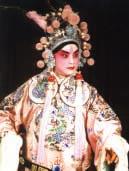
Li Hongtu in Shooting an Arrow at the Lance
呂 布 李宏圖
紀 靈 陳俊傑
劉 備 韓勝存
張 飛 翟憲忠
Li Hongtu Lu Bu
Chen Junjie Ji Ling
Han Shengcun Liu Bei
Qu Xianzhong Zhang Fei
京劇《轅門射戟》出於《三國演義》第十六回。袁朮派遣大將紀靈攻劉備,約呂布共舉。
劉備兵微將寡,恐不勝於袁朮,乃向呂布求援。呂因受袁、劉兩家相約,不好偏袒, 遂設筵為兩家解和;席間,呂布以射戟「憑天斷」的方法解之,袁、劉兩家罷動干戈。
In the era of the Three Kingdoms, Yuan Zhu sends Ji Ling to attack his enemy Liu Bei and asks Lu Bu for a military alliance. Liu Bei realising his limited military power also asks for help from Lu Bu.
Invited by both sides, Lu Bu tries to play the peace-maker. At a banquet in the barracks, Lu Bu asks both sides to end their enmity if he can show his supremacy over the two of them by shooting an arrow at a lance to be placed at the entrance of the barrack. Lu Bu surprises Liu Bei and Ji Ling with his successful shot, and they agree to make peace.
蘇 三 郭 偉
王金龍 李宏圖
潘必正 韓勝存
劉秉義 朱 強
崇公道 梅慶陽
Guo Wei Su San
Li Hongtu Wang Jinlong
Hen Shengcun Pan Bizheng
Zhu Qiang Liu Bingyi
Mei Qingyang Chong Gongdao
名妓蘇三(玉堂春)被控謀殺親夫,押至太原,適山西巡按王金龍查閱案卷,遂同布政、 按察二使會審。公堂上,王金龍忽見被審者乃昔日盟誓白首偕老之蘇三,神情激動, 頓時昏厥,幾至不能續審。蘇三供詞中詳述前情,王金龍聞聽又幾度不能自制,
Su San, also known as Yu Tang Chun, a famous former courtesan, is being wrongfully accused of killing her husband. When the officials send Su San to court they have to pass through Tai Yuan city. Wang Jinlong, the Inspector General of Shanxi Province, upon reading about the case, requests that it be reopened and tried by him together with a commissioner and a provincial judge.
When Su San enters the court Jinlong recognises her as his former lover, loses consciousness and almost brings the trial to a halt. While Su San proceeds with the details of her story, Jinlong continues to feel uncomfortable about her presence in the court and excuses himself, passing on the trial to the two judges on the pretext of illness.
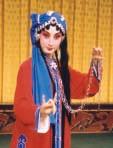
Guo Wei in The Trial of Yu Tang Chun, the Courtesan
二○○四年二月十四日(星期六)
梅、尚、程、荀四大流派匯演
演出長約3 小時, 包括一節15分鐘中場休息
漢明妃─出塞(尚派)
14 February 2004 (Saturday)
Gala Evening
Running time: approximately 3 hours, including a 15 minute interval
Lady Ming of the Han Dynasty Leaving her Homeland (Shang School)
Liu Shanli Wang Zhaojun
Mei Qingyang Wang Long
Li Dan Groom
漢元帝後宮美女王嬙(昭君)因不肯賄賂畫工毛延壽,被畫為醜狀,元帝不加召幸,昭君 彈琵琶自傷,元帝發見其美,立為明妃,欲斬毛延壽。毛逃往匈奴,獻王嬙畫像,匈奴 發兵索王嬙,元帝感兵力不足,最後忍痛送昭君往匈奴。昭君離中原時,萬分悲痛。
Wang Qiang, also known as Wang Zhaojun, has been short-listed as one of Emperor Han Yuandi’s future concubines. However, as she refuses to bribe the portrait painter, Mao Yanshou, he paints her as a rather homely creature, thus losing her the chance of being chosen by the Emperor. Stuck in a corner at the palace, Zhaojun consoles herself by playing the pipa. Her singing attracts the attention of Emperor Yuandi, and her extraordinary beauty is discovered, resulting in her being named Lady Ming.
Fearing punishment, Mao escapes to the territory of Xiongnu and persuades the rival warlord to ask for Zhaojun’s hand in marriage. Emperor Yuandi is well aware of the weakness of his country’s military defence, and agrees to give up the woman he loves to avoid a direct confrontation. Disillusioned, Zhaojun tearfully leaves her homeland with a heavy heart.


呂昆山(左)及耿巧雲《辛安驛》
Lu Kushan (left) and Geng Qiaoyun in Xin An Inn
周鳳英 耿巧雲
趙雁蓉 徐 暢
何四叔 張亞寧
楊 勝 郭振龍
李 氏 呂昆山
趙美蓉 唐禾香
趙景龍 王旭東
Geng Qiaoyun Zhou Fengying
Xu Chang Zhao Yanrong
Zhang Yaning The Fourth Uncle He
Guo Zhenlong Yang Sheng
Lu Kunshan Mrs Li
Tang Hexiang Zhao Meirong
Wang Xudong Zhao Jinglong
明代,趙景龍聚義廬山。其父為嚴嵩所害,其妹趙美蓉、雁蓉逃出,欲往廬山尋兄,為
便於行路,雁蓉喬裝男子、佯稱兄妹,夜宿辛安驛。店主女兒周鳳英,亦係遭嚴陷害之 官家眷屬。鳳英見雁蓉俊雅,強邀成婚,洞房時方知雁蓉為女子,正爭吵間,景龍下山 投宿此店,兄妹相逢,最後,景龍與鳳英結為伉儷,同奔廬山。
During the Ming Dynasty, the wicked Prime Minister Yan Song persecuted the Zhao family. After his father’s death, Zhao Jinglong rebelled against the government and occupied Lu Shan.
Jinlong has two sisters, Zhao Meirong and Zhao Yanrong. To escape danger Yanrong disguises herself as a man to allow the sisters to travel more safely in search of their brother at Lu Shan. Eventually the girls take shelter in the Xin An Inn for the night. The daughter of the inn-keeper Zhou Fengying, whose family has also been persecuted by Yan Song, is attracted by Yanrong’s appearance and forces ‘him’ to marry her, discovering on their wedding night that ‘he’ is a woman. During their quarrel, Jinlong arrives at the inn and becomes reunited with his sisters. He also falls in love with and marries Fengying before they leave for Lu Shan.
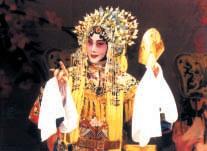
董圓圓《貴妃醉酒》
Dong Yuanyuan in The Imperial Concubine Yang Guifei Getting Drunk
演員表
楊玉環 董圓圓
高力士 梅慶陽
裴力士 曾寶玉
The Imperial Concubine Yang Guifei Getting Drunk (Mei School)
Cast Dong Yuanyuan Yang Yuhuan (Yang Guifei)
Mei Qingyang Gao Lishi
Zeng Baoyu Pei Lishi
貴妃楊玉環在百花亭等候唐明皇(玄宗),一起飲酒賞花。候駕多時,太監卻來稟, 皇帝已轉至西宮。貴妃聽知此訊,心中極為不悅,萬端愁緒無以排遣,只得一人 獨自飲酒,賞花解悶。宮娥太監輪流進酒,不覺喝得大醉,醉後更覺煩悶,命高力士
到西宮請唐明皇來此共飲。經高、裴二人婉言相勸,才滿懷怨恨,獨自回宮。
Yang Yuhuan, the beloved Imperial Concubine, has a rendezvous with the Emperor Tang Xuanzong at the Pavilion of a Hundred Flowers for a drink. She is kept waiting for a long time, and is eventually informed by a eunuch that the Emperor has gone to the West Palace instead. Upon hearing the news, she is frustrated and distraught and begins drinking by herself. Served by her dutiful ladies-in-waiting and eunuchs, she becomes drunk and insists that the Emporer be invited to join her. Gao Lishi, a tactful servant, manages to talk her out of this and she gradually comes to her senses and sadly returns to her chamber.
春閨夢(程派)
張 氏 張火丁
孫 氏 金立水
劉 氏 呂昕
李 威 俞雷
王 恢 宋小川
丫 環 呂昆山
李 信 趙志強
劉 虞 景璉璉
Zhang Huoding Mrs Zhang
Jin Lishui Mrs Sun
Lu Xin Mrs Liu
Yu Lei Li Wei
Song Xiaochuan Wang Hui
Lu Kunshan Maid
Zhao Zhiqiang Li Xin
Jing Lianlian Liu Yu
漢時,公孫瓚與劉虞爭地,各自強徵百姓從軍。王恢與妻張氏新婚不久,便與同村趙克奴、
李信等一同被徵入伍,至軍中即戰死。張氏懸念日久,積思成夢; 夢王返家重聚,又連夢戰火兵燹種種情狀。
In the Han Dynasty, warlords Gongsun Zan and Liu Yu fight fiercely for land. Along with his fellow countrymen Zhao Kenu and Li Xin, the newly married Wang Hui is drafted to war, and perishes during one of the battles. His wife Zhang, not knowing the sad fate of her enlisted husband, thinks of him constantly and dreams of his happy home-coming.

張火丁《春閨夢》 Zhang Huoding in A Dream within the Boudoir



程硯秋(1903-1958)是一位具有鮮 明風格和卓越才華的傑出戲曲表 演藝術家;他創立的程派旦行藝 術是京劇寶庫中的重要組成部 份。程先生舞台生活最活躍的時 期,正值京劇發展最蓬勃的黃金 年代,在流派爭鳴、名家輩出的 形勢下,程先生脫穎而出,穩佔 四大名旦一席,長期受到觀眾 歡迎。
文:譚榮邦

程先生舞台上的發展並非一帆風順,而是 經過一番崎嶇的歷程,費盡無窮的心血和 努力,方才奠定他在藝壇上的崇高地位。
他的嗓子本來不好,有所謂「鬼音」,為當 時唱戲的大忌;程先生體格魁梧,並非演 旦角的好材料,而且出道較晚(他曾拜梅蘭 芳為師),在種種不利的因素下,如非因為 程先生的過人毅力,可能今日的藝壇上根 本便沒有程派藝術的存在了。
京劇旦行的唱腔,一直崇尚明亮、清脆的唱 法,程先生在倒倉(即變聲期)之後,嗓子沒 有完全恢復過來,對別人來說,旦行的生涯 可能便就此結束;但程先生在充分了解自己 先天條件的局限下,另闢蹺徑,不強求響徹 行雲,但仿效低迴流水,創造出別具一格的 「程腔」。
「程腔」的音色,比較近乎西洋歌劇 花腔女中音的音域和韻味,在當時的京劇舞 台上從未聽過這樣的唱法,再加上程先生對 音韻特別講究,吐字仔細清醇,低迴處纖若 游絲,欲斷還連,激情處神情俱茂,蕩氣迴 腸,而程先生更擅長因人、因情、因戲而編 作新腔,他汲取各流派、各行當以及其他地 方戲曲的特點,大大豐富了程腔的藝術表現 和感染力。
在做工方面,四大名旦均摒棄以往旦行重 唱不重演,「抱着肚子呆唱」的演出方法, 而在身段、做手、舞蹈以及演技方面各自 鑽研和發揮,又就各人本身不同的條件而 發展為截然不同的演出風格。特別就程派 藝術而言,除了唱腔,對整體演出的做、 唸、舞是有極嚴格的要求的,即使同樣的
程式或動作,在不同人物身上和不同的環 境下都有不同的處理。走圓台是京劇一個 最基本的動作,演員在戲台上走一大圈以 示人物走了一大段路程,但在程先生的演 出中,無論是村婦被苛政所逼精神崩潰後 遁入荒山(《荒山淚》);抑或少婦思夫情 切,夢中追趕夫郎去到戰場(《春閨夢》); 傭婦在小樓上尋找失物(《鎖麟囊》),程先 生都以不同的步伐,千變萬化的水袖動 作,配合不同的唱腔,通過走圓台而表現 出人物當時不同的心情、處境;無論動 作、唱腔、程式都是要為戲劇服務,絕非 為演而演或為唱而唱,這便是程派藝術的 精髓所在。
程派劇目並不追求離奇曲折的劇情,而只 着重把握三幾個重點,加以藝術上的加 工,完全沒有多餘的情節或人物,特別受 到文化水平較高的觀眾所歡迎。然而在某 一段時期中,程派的影響力似乎略遜於其 他流派,這固然因為程派藝術實在難學難 精,再者在解放之後,戲曲界受到極左派 政治的影響,程派藝術因而受到一定的壓 力。在樣板戲盛行期間,程派外柔內剛、 纏綿委婉的唱做風格完全派不上用場,因 而備受冷落,使程派藝術幾有沒落之虞。 幸而在文革過後,經過程派傳人的不斷努 力,終能薪火相傳,使程派藝術再顯光 芒,不但保留了程派的獨特表演風格和代 表劇目,更在原有的藝術基礎上開拓和發 揚,編演了一些根據程派風格而寫成的新 劇,包括張火丁的現代戲《江姐》,打破了 程派藝人不能演時裝現代戲的誤解。
全文原載於《閱藝2003》
Cheng Yanqiu (1903-1958) was a remarkable opera performer, whose dan discipline has become an important element in Beijing Opera. The “cheng” singing technique he developed is similar to that of the coloratura mezzo-soprano in Western opera, with a breadth and style of voice that had never before been used in Beijing Opera.
by Tam Wing-pong
Cheng always made stringent demands on his performers, and would make different arrangements of the same action and formula to fit different roles and atmospheres. This year’s Arts Festival will showcase three pieces that reflect his life’s work - Tears in the Wilderness, A Dream within the Boudoir and The Unicorn Pouch. Tears in the Wilderness and A Dream within the Boudoir both use the past to criticise the present, offering a positive reflection of society in the late 1920s and 1930s.
Tears in the Wilderness is a tragedy based on the saying, “a harsh government is more menacing than a fierce tiger”. It describes the tragic series of events that befall a farmer’s family. With heavy taxes to pay, the men of the family were forced to enlist in the army, and a closely knit family is torn apart. Perhaps the most fascinating part of the story occurs after the death of the main character Zhang Weizhu, when the tiger that has eaten her father-in-law and husband returns and lunges at the two tax collectors. It does not harm them, but just wags its tail and saunters away.

Pondering hard, the men come up with two explanations: one of them thinks that they are not human at all as even the tiger would not eat them. The other thinks that the county government’s harsh way of collecting taxes has scared the tiger away.
The almost absurd ending elevates the play from an ordinary moral tale to a striking work of great power, reminiscent of Bertolt Brecht’s play Mother Courage and Her Children. Tears in the Wilderness brings the art of the Cheng School fully into play. The portrayal of Zhang Weizhu’s insanity as she dances across the stage, singing, with her long sleeves flowing is a match for any such scenes of madness in a Western opera written by, for instance, Donizetti or Bellini.
A Dream within the Boudoir has an antiwar theme and concerns a young woman named Zhang who misses her husband as he is away fighting in the war. In a dream she has a vague image of her husband coming home briefly and then going off to the war again. In vain Zhang chases

him, but all she sees is the terror and cruelty of war. This dream can be compared with the garden dream scene in Tang Xianzu’s play The Peony Pavilion ; although there is only one actor performing on stage and the scene is quite short, the anti-war sentiment is subtly yet vividly portrayed.
The third play of the Cheng School, The Unicorn Pouch, is quite different from the previous two and has a refreshing, warm and light-hearted story depicting people’s loving kindness and helpfulness. The story revolves around a rich woman who helps people in need without asking for anything in return and when her own fortune’s change, she accepts reality and lives a humble life. Mirroring the kindness of this woman is a poor girl who does not bemoan her fate in bad times and in better times, remembers those who have helped her and reaches out to help them in return. This touching tale begins with a jewellery pouch embroidered with unicorns changing ownership twice. Such a theme is quite rare in Beijing Opera, and coupled with the beauty of the Cheng School singing and acting skills, it will surely delight the audience.
To commemorate the 100th anniversary of Cheng Yanqiu’s birth, the 2004 Festival will present a special series of performances featuring the best of the Cheng School repertoire. In the final performance of this commemorative series, the Festival has invited representatives of the three other “Great Schools of Dan” in Beijing Opera, the Mei, Xun and Shang Schools to perform some of their most famous works (including The Imperial Concubine Yang

Guifei Getting Drunk, Xin An Inn and Lady Zhaojing Leaving Her Homeland ). The performance will end with the Cheng School’s A Dream within the Boudoir , offering the audience a rare opportunity to enjoy the artistry and styles of four major leading female roles in the same evening.
The full version of this article first appeared in FestMag 2003
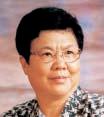
京劇導師
Beijing Opera Teacher
李文敏,國家一級演員,出身於梨園世家,1952 年入讀北京藝培戲校
(北京巿戲曲學校前身)一期,1957年師承趙榮琛,專攻程派,1960年 加入北京巿青年京劇團。1963 年起從事教育工作,在中國戲曲學院、
上海戲劇學院戲曲舞蹈分院等院校授課,培育不少優秀人才,包括張 火丁和郭偉等。
1992年獲全國首屆少兒京劇大賽指導教師一等獎,1995 年率領其學生 在香港演出《荒山淚》、《鎖麟囊》等劇目,大獲好評。
Born into a Chinese opera family, Li Wenmin, is a “First Rank” actress in China. In 1952 she entered the former Chinese Opera School of Beijing and then specialised in the opera of the Cheng school, under the tutelage of Zhao Rongchen in 1957. Li joined the Beijing Youth Peking Opera in 1960. Since 1963, she has taught in many educational institutions, including the Academy of Chinese Traditional Opera, as well as the College of Opera and Dance of the Shanghai Theatre Academy, in which she has trained a number of opera elites, including Zhang Huoding and Guo Wei.
In 1992 Li was awarded the first prize as an opera master in the first Juvenile Beijing Opera Competition. In 1995, as a group leader, Li’s students staged Tears in the Wilderness and The Unicorn Pouch in Hong Kong.

薛湘靈(鎖麟囊)/張慧珠(荒山淚)/張氏(春閨夢) Xue Xiangling (The Unicorn Pouch); Zhang Huizhu (Tears in the Wilderness); 演員 Mrs Zhang (A Dream within the Boudoir) Actor
張火丁為中國京劇院國家一級演員, 1989 年天津戲曲學校畢業,同年考入北 京軍區戰友劇團,1995 年加入中國京劇院, 2001 年中國戲曲學院第二屆中國 京劇研究生班畢業。代表劇目包括《鎖麟囊》、《荒山淚》及《春閨夢》等。1996 年被中國京劇基金會推薦為第二屆中國京劇之星。 2002 年率中國京劇院《江 姐》劇組赴德國科隆參加世界藝術節演出,備受好評。
“First Rank” actress and a member of the China National Beijing-Opera Theater, Zhang Huoding, graduated from the Chinese Opera School in Tianjin in 1989, and was accepted by the Comrade Beijing-Opera Troupe of the Military District in Beijing the same year. She joined the China National Beijing-Opera Theater in 1995, graduating from the Excellent Young Beijing-Opera Performers (Second Edition) Academy of Chinese Traditional Opera in 2001. Her repertoire includes The Unicorn Pouch, Tears in the Wilderness and A Dream within the Boudoir. Zhang was awarded the Star of Beijing-Opera in China by the Foundation of Beijing-Opera in China in 1996, and in 2002 performed Sister Jiang with the China National Beijing-Opera Theater in Cologne, Germany, to great acclaim.

周庭訓(鎖麟囊)/王恢(春閨夢)
Zhou Tingxun (The Unicorn Pouch); 演員 Wang Hui (A Dream within the Boudoir) Actor
宋小川為中國京劇院國家一級演員, 1982 年中國戲曲學院畢業,擅長文武 小生,後拜著名京劇表演家葉少蘭為師。宋氏嗓音清亮、唱法細膩,演出 劇目包括《白蛇傳》、《呂布與貂蟬》及《龍鳳呈祥》等,曾赴澳洲、法國、香 港、台灣等地演出。
Song Xiaochuan, a “First Rank” actor in China and a member of the China National BeijingOpera Theater, graduated from the Academy of Chinese Traditional Opera in 1982. He studied under the famous performer Ye Shaolan, and specialises in both wen sheng and wu sheng roles. Known for his clear singing-voice and his impeccable skills, Song’s repertoire includes Legend of the White Snake , Lubu and Diaochan, and Dragon and Phoenix in Harmony. He has performed in Australia, France, Hong Kong and Taiwan.

趙守貞(鎖麟囊)/趙雁蓉(辛安驛)
Zhao Shouzhen (The Unicorn Pouch);
演員
Zhao Yanrong (Xin An Inn) Actor
徐暢為中國京劇院演員, 1985 年考入中國戲曲學院,專攻青衣花旦,在校 七年間曾演出多部著名劇目,包括 1992 年以《白蛇傳》作畢業公演,備受好 評,及後加入中國京劇院。徐氏嗓音圓潤、扮相俊麗,為中國京劇院青年 團主要演員之一。
A member of the China National Beijing-Opera Theater, Xu Chang entered the Academy of Chinese Traditional Opera in 1985, specialising in qingyi huadan roles. While still in school, she performed in many operas, including Legend of the White Snake, in 1992 for her graduate performance. Since joining the China National Beijing-Opera Theater she has also become one of the core members in its Youth Division.

呂昆山 Lu Kunshan
碧玉(鎖麟囊)/王四香(荒山淚)/李氏(辛安驛)/丫環(春閏夢)
Bi Yu (The Unicorn Pouch);
Wang Sixiang (Tears in the Wilderness);
演員
Mrs Li (Xin An Inn); Maid (A Dream within the Boudoir) Actor
呂昆山為中國京劇院三團副團長及國家一級演員, 1982 年中國戲曲學院畢 業,在校期間專攻丑行。呂氏扮相俏皮、文武兼備,擅演劇目包括《群英 會》及《秋江》等。 2000 年在全國京劇演員評比展演中榮獲一等獎,曾往美 國、日本及台灣等地演出。
Lu Kunshan, a “First Rank” actor and Deputy Director of the Third Troupe of the China National Beijing-Opera Theater, graduated from the Academy of Chinese Traditional Opera in 1982. Specialising in chou roles, his comical appearance and versatile skills have won him high praises. In 2000 he won the first prize at the National Beijing-Opera Performing Competition. Lu’s repertoire includes A Gathering of Heroes and Autumn River. He has toured the US, Japan and Taiwan.

穆玉璣(白水灘)
演員 Mu Yuji (Bloodshed on White Water Beach) Actor
張火千為中國京劇院演員, 1987 年吉林省戲曲學校畢業,同年考入北京軍區 戰友京劇團, 1997 年加入中國京劇院。在校期間先學老生,後攻武生。張氏 扮相俊美,氣質威武, 1998 年於北京首演《白水灘》穆玉磯一角,一鳴驚人。
其他拿手戲目包括《三岔口》及《英雄義》等,曾隨團往英美等地演出。
A member of the China National Beijing-Opera Theater, Zhang Huoqian graduated from the Chinese Opera School in Jilin in 1987, and was accepted by the Comrade Beijing-Opera Troupe of the Military District in Beijing the same year. Zhang joined the China National Beijing-Opera Theater in 1997, specialising in lao sheng and wu sheng roles. His debut as Mu Yuji in Bloodshed on White Water Beach in 1998 stunned Beijing’s theatre world. He has since appeared in The Cross-Road and Duty of a Hero . Zhang has performed in the US and the UK.

王寶釧(三擊掌)
演員 Wang Baochuan (Estrangement between Father and Daughter) Actor
沙霏1999 年起師隨李文敏,2000 年考入北京巿戲曲學校。2001 年以《六月雪》
獲北京巿第四屆少兒京昆大賽「北京巿二十一世紀實驗學校盃」專業組一 等獎。
Sha Fei has been a student of Li Wenmin since 1999. She entered the Chinese Opera School of Beijing City in 2000 and won a prize for her role in Snow in June at the 4th Juvenile Beijing Opera Competition in 2001.

郭偉
賀后(賀后罵殿)/蘇三(玉堂春)
He Hou (Dowager He Hou Confronting the Emperor); 演員 Su San (The Trial of Yu Tang Chun, the Courtesan) Actor
郭偉為北京京劇院國家二級演員,主攻青衣,1988 年考入北京巿戲曲學校, 1997 年加入北京京劇院,主演劇目包括《呂布與貂蟬》、《荒山淚》等,並多次 獲全國及北京巿多個優秀表演獎項。
A member of the Peking Opera House of Beijing, Guo Wei is a “Second Rank” actress in China and specialises in qingyi roles. She entered the Chinese Opera School of Beijing City in 1988, and joined the Peking-Opera House of Beijing in 1997. Winner of numerous nationwide performing awards and prizes given by cities all over China, Guo’s repertoire includes Lubu and Diaochan and Tears in the Wilderness

呂布(轅門射戟)/王金龍(玉堂春)/裴力士(貴妃醉酒)
Lu Bu (Shooting an Arrow at the Lance);
Wang Jinlong (The Trial of Yu Tang Chun, the Courtesan); 演員 Pei Lishi (The Imperial Concubine Yang Guifei Getting Drunk) Actor
李宏圖為北京京劇院國家一級演員,亦為中國首屆京劇演員研究生, 1982 年 中國戲曲學院畢業,代表劇目有《呂布與貂嬋》、《轅門射戟》等。李氏扮相俊 美、嗓音高亢,獎項包括五度奪得北京青年戲曲演員優秀表演獎,以及中國 戲劇梅花獎。
Li Hongtu, a “First Rank” actor in China and a member of the Peking Opera House of Beijing, graduated from the Academy of Chinese Traditional Opera in 1982. Five-time winner of the prestigious Beijing Young Opera Performer Award, and winner of the Plum Flower Award, Li is known for his smart presence and the prowess of his singing voice. His repertoire includes Lubu and Diaochan and Shooting an Arrow at the Lance.

劉山麗 Liu Shanli
王昭君(漢明妃 出塞)
Wang Zhaojun
演員 (Lady Ming of the Han Dynasty Leaving her Homeland) Actor
劉山麗為北京京劇院國家二級演員,曾獲全國電視大獎賽銀屏獎以及北京巿 青年京劇演員匯演優秀表演獎。經常上演劇目包括《漢明妃》及《彩樓記》等。
劉氏曾赴日本、意大利、英國等地演出。
Liu Shanli, a “Second Rank” actress in China and a member of the Peking Opera House of Beijing, has won both the Silver Award at the National Television Competition and Performer of Excellence at the Beijing City Young Beijing-Opera Performers Conference. Her repertoire includes Lady Ming of the Han Dynasty and Story of the Flamboyant Chamber. She has performed in Japan, Italy and the UK.

耿巧雲
Zhou Fengying (Xin Ann Inn) Actor
耿巧雲為中國京劇院國家一級演員,亦為首屆中國京劇優秀青年演員研究 生。耿氏1973 年考入中國戲曲學校,專攻花旦,1981 年加入中國京劇院。耿 氏憑演出《賣水》一折,獲得 1991 年全國中青年電視大獎賽最佳表演獎(旦角 組)。耿氏曾赴多地演出,包括台灣、韓國、日本、澳洲等。
Geng Qiaoyun, a “First Rank” actress in China and a member of the China National Beijing-Opera Theater, specialises in huadan roles. She was accepted by the Academy of Chinese Traditional Opera in 1973 and joined the China National Beijing-Opera Theater in 1981. In 1991, Geng won the Best Performance Award (dan) at the National Television Competition for her role in Selling Water and in 1999 she graduated from the class of Excellent Young Beijing-Opera Performers (First Edition). She has performed in Taiwan, Korea, Japan and Australia.

楊玉環(貴妃醉酒)
Yang Yuhuan
演員
(The Imperial Concubine Yang Guifei Getting Drunk) Actor
董圓圓為北京京劇院旦角演員,1988 年中國戲曲學院畢業,代表劇目有《王昭 君》、《白蛇傳》、《花木蘭》等。 2001 年,董氏參與第三屆中國京劇藝術節, 演出大型京劇《洛神賦》中甄宓一角,並獲得優秀表演獎。董氏現正於第三屆 中國優秀青年京劇演員研究生班繼續進修。
Dong Yuanyuan graduated from the Academy of Chinese Traditional Opera in 1988. A member of the Peking-Opera House of Beijing specialising in dan roles, her repertoire includes Wang Zhaojun, Legend of the White Snake and Hua Mulan. Her performance as Zhen Mi in Ode to the Goddess of Luo at 2001’s Beijing-Opera Arts Festival of China won her an Excellent Performer Award. Dong is a student in the class of Excellent Young Beijing-Opera Performers (Third Edition).